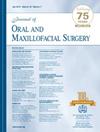口腔癌术后言语和吞咽效果比较研究:下颌外侧连续性修复的影响
IF 2.3
3区 医学
Q2 DENTISTRY, ORAL SURGERY & MEDICINE
引用次数: 0
摘要
背景:晚期口腔癌的下颌骨切除术会造成复杂的缺损。目的:本研究的目的是比较口腔鳞状细胞癌(OSCC)患者进行侧下颌骨切除术后,下颌骨连续性重建与否对术后言语和吞咽功能的影响:这项回顾性队列研究在印度喀拉拉邦马拉巴尔癌症中心进行,对象是2016年1月至2021年12月期间因OSCC而接受侧下颌骨切除术的患者。研究排除了复发或第二次原发性OSCC患者,或患有精神疾病和认知障碍的患者,或接受过任何类型的咽喉切除术的患者:主要结果变量:结果变量为术后言语能力:主要结果变量:结果变量为术后语言表达能力(用 7 分语言清晰度量表测量)和吞咽能力(用功能性口腔摄入量表测量):协变量包括年龄、性别、肿瘤部位、下颌骨缺损和辅助治疗:数据分析包括χ2、费雪精确检验、独立t检验、斯皮尔曼相关检验和单因素方差分析。P 值 结果:研究样本中有 201 例患者,其中 74 例(36.82%)恢复了连续性,127 例(63.18%)恢复了连续性。恢复连续性组的平均年龄为(54.97±9.68)岁,未恢复连续性组的平均年龄为(59.49±9.95)岁(P 结论及相关性:下颌外侧连续性重建与术后语言和吞咽能力的改善无关。本文章由计算机程序翻译,如有差异,请以英文原文为准。
A Comparative Study of Speech and Swallowing Postoperative Outcomes in Oral Cancer: Impact of Lateral Mandibular Continuity Restoration
Background
Surgical resection with mandibulectomy in advanced oral cancer results in complex defects. The influence of reconstruction of mandibular continuity on postoperative speech and swallowing function, though crucial, is not widely studied.
Purpose
The purpose of study was to compare the speech and swallowing outcomes of oral squamous cell carcinoma (OSCC) patients with lateral mandibulectomy, with or without the restoration of mandibular continuity.
Study Design, Setting, Sample
This retrospective cohort study was performed at the Malabar Cancer Centre, Kerala, India, on patients who had undergone lateral mandibulectomy for OSCC from January 2016 to December 2021. Patients with recurrent or second primary OSCC, or with psychiatric disorders and cognitive impairment, or in whom any type of glossectomy was done, were excluded from the study.
Predictor Variable
The predictor variable was reconstruction status of mandibular continuity, coded as yes when it is restored and no for vice-versa.
Main Outcome Variable(s)
The outcome variables were postoperative speech outcome measured with a 7-point rating speech intelligibility scale and swallowing outcome measured with functional oral intake scale.
Covariates
Covariates included age, sex, tumor subsite, mandibular defect, and adjuvant treatment.
Analyses
Data analyses included χ2, Fisher's exact test, independent t test, Spearman's correlation test, and one-way analysis of variance test. P values < .05 were considered statistically significant.
Results
The study sample had 201 patients, with continuity restored in 74 (36.82%) patients and vice versa in 127 (63.18%) patients. The mean age in the continuity restored group was 54.97 ± 9.68 years, and in the continuity not restored group, it was 59.49 ± 9.95 years (P < .05). Both the groups had more male patients (P = .15). The speech scores in both groups at 1 month (P = .66), 3 months (P = .45), and 6 months (P = .33) of postoperative period were compared and had no statistically significant difference. The swallowing scores in groups at 1 month (P = .5), 3 months (P = .5), and 6 months (P = .7) of postoperative period were also compared and had no statistically significant difference.
Conclusion and Relevance
Reconstruction of lateral mandibular continuity was not associated with improved postoperative speech and swallowing.
求助全文
通过发布文献求助,成功后即可免费获取论文全文。
去求助
来源期刊

Journal of Oral and Maxillofacial Surgery
医学-牙科与口腔外科
CiteScore
4.00
自引率
5.30%
发文量
0
审稿时长
41 days
期刊介绍:
This monthly journal offers comprehensive coverage of new techniques, important developments and innovative ideas in oral and maxillofacial surgery. Practice-applicable articles help develop the methods used to handle dentoalveolar surgery, facial injuries and deformities, TMJ disorders, oral cancer, jaw reconstruction, anesthesia and analgesia. The journal also includes specifics on new instruments and diagnostic equipment and modern therapeutic drugs and devices. Journal of Oral and Maxillofacial Surgery is recommended for first or priority subscription by the Dental Section of the Medical Library Association.
 求助内容:
求助内容: 应助结果提醒方式:
应助结果提醒方式:


